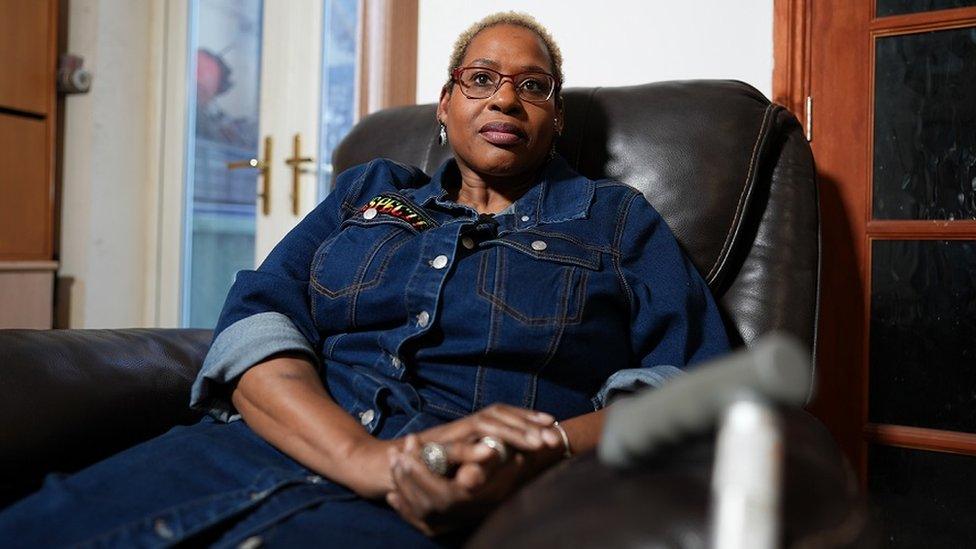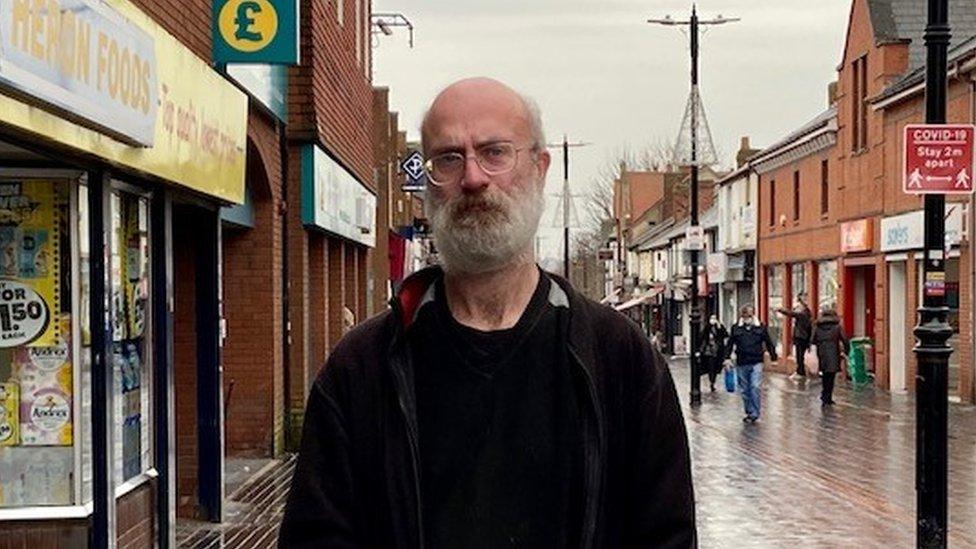Energy bills: 'It feels like I'm sleeping outside'
- Published

Thelma Spalding is struggling to cope with her bills
Every night, Thelma Spalding goes round her house trying to switch off every appliance.
It's not an easy feat for the 54-year old, who relies on carers and walks with a stick.
But she's following the advice given to her by her energy company as she desperately tries to keep her fuel bills down.
Thelma had to leave her job as an NHS support worker a year ago after being assaulted at work. Since then, her monthly gas and electricity bill has shot up from £44 to £99, meaning she can afford to heat only one room.
She has burns on her arms from trying to keep her wood burner going and has started using food banks to make ends meet.
She says: "I live in this one room. There's only me and the dogs, so why am I being charged this much for electricity and gas?
"In bed you're so cold that it's like you're sleeping outside. My carer gets me dressed and I wear two pairs of leggings, a pair of trousers, a vest, a T-shirt and a dress - and I'm in the house. It's so cold in the kitchen and the bathroom."
'Everything is going up'

She adds: "You sit there and you worry about how you are going to pay your bills.
"Everything is going up but the money they give you remains the same. I can't sleep at night thinking about what I can cut out."
Thelma, who lives in Wednesbury in the West Midlands, is one of millions of people set to be affected by changes to the energy price cap, which sets the maximum that energy firms can charge customers on a standard tariff.
It comes into effect in April and is expected to rise steeply due to a big increase in global wholesale prices.
Analysis by the Resolution Foundation, a think tank focusing on living standards, suggests that a price-cap rise of more than 50% will mean average household energy bills go up by more than £700 a year, to about £2,000.
The think tank suggests this will tip an extra four million households in England into "fuel stress" - where they spend more than 10% of their family budget on energy bills.
That would mean that more than one in four households would fall into this category - as many as one in three in north-east England and the Midlands.
'I'm being very frugal'

James switches his central heating off when his daughter isn't with him
James Harpin, 33, has been told his energy bills are likely to top £400 this year, up from £250 in 2021. He's looked at switching energy companies, but no-one can offer him a cheaper deal.
When his daughter stays with him three nights a week, everything is switched on. But when she leaves, he has to be much more careful.
"I'm so acutely aware of what the extra electric is costing me. I'm being very frugal, I won't have a bath - I'll have a shower - and I won't put the heating on, I'll put on layers and blankets," says James, also from Wednesbury, who was forced to give up work because of his deteriorating health.
"I'm happy to take those steps myself, but for my daughter I think being warm is a standard that needs to be there all the time.
"It's a situation I've never found myself in until this year - you shouldn't think twice about putting your electric on or your washer or the heating, but at the moment you've really got to."
'It's my biggest concern'

Robert had to go to a food bank after spending extra money on heating
Robert Royal, who lives nearby, says he never thought twice about his bills until his manufacturing job ended unexpectedly just before Christmas.
The 51-year-old had to spend the majority of his emergency universal credit payment on rent, with about £60 left over.
He estimates that his energy tariff has almost doubled during the three months he has lived in his flat, meaning that the remaining money has had to be spent on electricity, forcing him to use a food bank for meals.
His electric storage heater "eats electricity like it's going out of fashion", and he watches his smart meter constantly, worried that his tariff could change at any time.
"Being temporarily out of work, it's probably my biggest concern. I don't want to wake up at 04:00 and find the emergency credit on the meter has gone."
Thelma, James and Robert live within the borough of Sandwell, one of England's most affected areas.
In 2019, one in five households there lived in fuel poverty, which was then defined as living in an energy-inefficient home and having disposable income below the poverty line.
'Staggering hike'
Citizens Advice, which runs an energy project in the borough, says one in four of its local clients is in this situation, up from one in 10 in July.
Some think they must have been given someone else's energy bill by mistake because it has increased by so much.
"Our front-line advisers are already supporting families facing desperate choices: parents skipping meals to feed their kids and people with a chronic illness living in one room because they can't afford to heat their home," the charity's chief executive, Dame Clare Moriarty, says.
"With a staggering further hike to energy bills expected this April, things are set to go from bad to worse, and people need support immediately."
Citizens Advice says that a one-off payment through the benefits system is "the single best way of helping low-income families weather April's price cap".
The Resolution Foundation is calling for the government to extend the warm-home discount scheme, external, which gives people on certain benefits or a low income the option to apply for a £140 discount on their energy bill.
It wants it extended to provide an additional £300 this summer, with eligibility extended to all those on working-age benefits and payments made automatically.
A spokeswoman for the government's business department said: "The energy price cap is currently insulating millions of consumers across the UK from high global gas prices. The rate is set by independent regulator Ofgem, not government.
"We recognise people are facing pressures with the cost of living, which is why we are taking action worth more than £4.2bn, including the warm-home discount and winter-fuel payments."